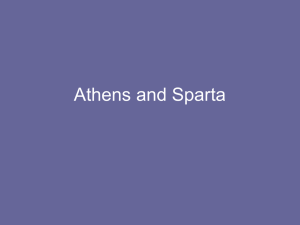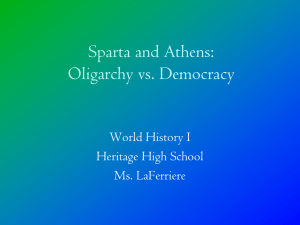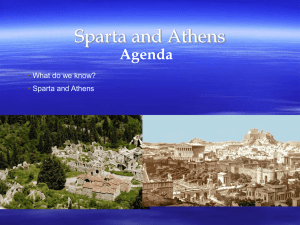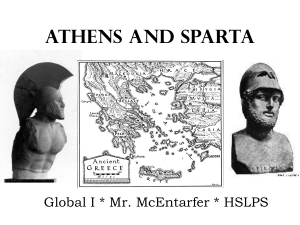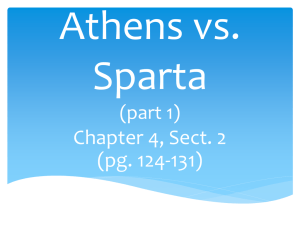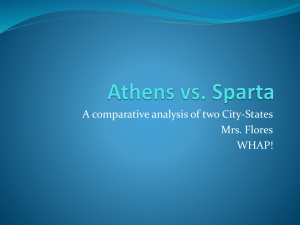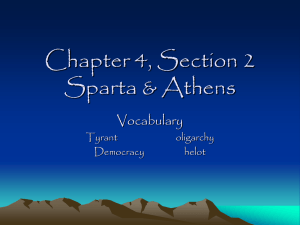the ancient greek city-state of sparta
advertisement
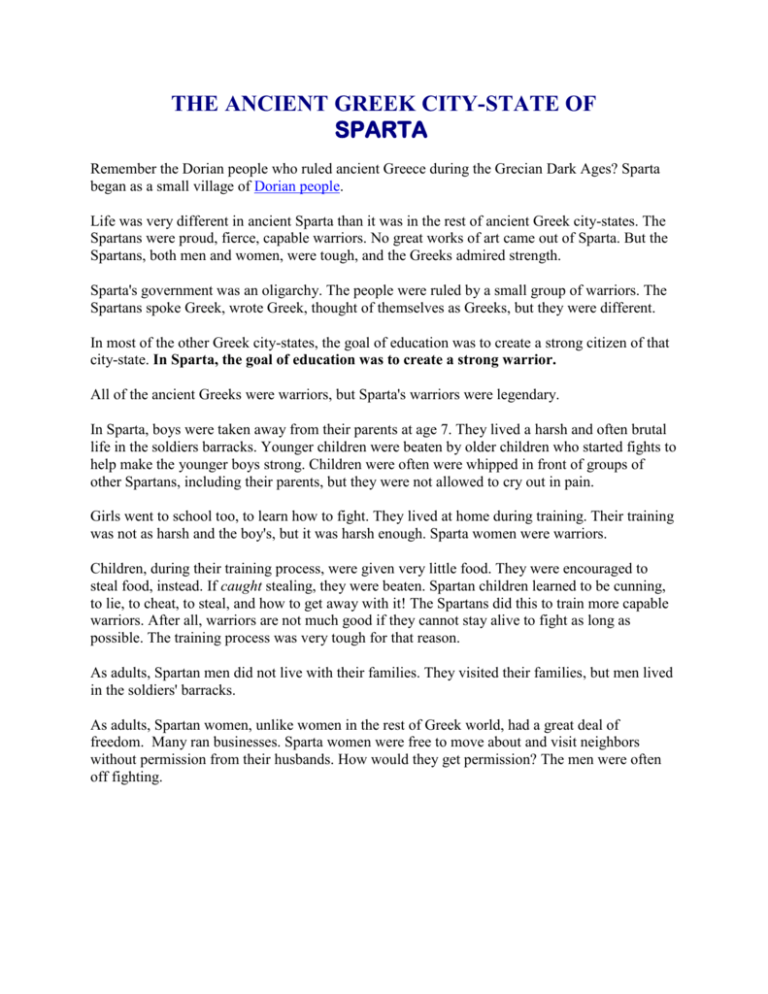
THE ANCIENT GREEK CITY-STATE OF SPARTA Remember the Dorian people who ruled ancient Greece during the Grecian Dark Ages? Sparta began as a small village of Dorian people. Life was very different in ancient Sparta than it was in the rest of ancient Greek city-states. The Spartans were proud, fierce, capable warriors. No great works of art came out of Sparta. But the Spartans, both men and women, were tough, and the Greeks admired strength. Sparta's government was an oligarchy. The people were ruled by a small group of warriors. The Spartans spoke Greek, wrote Greek, thought of themselves as Greeks, but they were different. In most of the other Greek city-states, the goal of education was to create a strong citizen of that city-state. In Sparta, the goal of education was to create a strong warrior. All of the ancient Greeks were warriors, but Sparta's warriors were legendary. In Sparta, boys were taken away from their parents at age 7. They lived a harsh and often brutal life in the soldiers barracks. Younger children were beaten by older children who started fights to help make the younger boys strong. Children were often were whipped in front of groups of other Spartans, including their parents, but they were not allowed to cry out in pain. Girls went to school too, to learn how to fight. They lived at home during training. Their training was not as harsh and the boy's, but it was harsh enough. Sparta women were warriors. Children, during their training process, were given very little food. They were encouraged to steal food, instead. If caught stealing, they were beaten. Spartan children learned to be cunning, to lie, to cheat, to steal, and how to get away with it! The Spartans did this to train more capable warriors. After all, warriors are not much good if they cannot stay alive to fight as long as possible. The training process was very tough for that reason. As adults, Spartan men did not live with their families. They visited their families, but men lived in the soldiers' barracks. As adults, Spartan women, unlike women in the rest of Greek world, had a great deal of freedom. Many ran businesses. Sparta women were free to move about and visit neighbors without permission from their husbands. How would they get permission? The men were often off fighting. Around 510 BCE - The Ancient Athenians Invented Democracy Over 2400 years ago, the famous Greek general, Pericles, said, "It is true that we (Athenians) are called a democracy, for the administration is in the hands of the many and not the few, with equal justice to all alike in their private disputes." Only in Athens, and only for a short time, "rule by many" meant that all citizens had to be willing to take an active part in government. That was the law. Each year, 500 names were drawn from all the citizens of Athens. Those 500 citizens had to serve for one year as the law makers of ancient Athens. All citizens of Athens were required to vote on any new law that this body of 500 citizens created. One man, one vote, majority ruled. Women, children, and slaves were not citizens, and thus could not vote. After the Peloponnesian War with Sparta, which Athens lost, once again Athens was ruled by a small group of people. But for a brief period of about 100 years, Athens was a democracy. It was not a perfect democracy, but it established the roots of democracy. We owe Athens a lot! A Direct Democracy: A government in which people vote to make their own rules and laws A Representative Democracy: A government in which people vote for representatives. The representatives make rules and laws that govern themselves and the people. THE ANCIENT GREEK CITY-STATE OF CORINTH As a coastal city-state, Corinth had a glorious history as a cultural and trade center. Corinth was a monarchy. The people were ruled by a king. The king had many advisors. Together, Corinth's government solved many problems that face cities today. For example, Corinth had a problem with unemployment. To solve this, they created a huge and successful public works program. This gave people work, like building new aqueducts, while solving other city problems, such as the need for an additional source of drinking water. To solve the problem of foreign money pouring into their polis, the government of Corinth created its own coinage. They forced traders to exchange their coins for Corinth's coinage at the bank of Corinth, for a fee of course. Corinthians were very good with money. Although Corinth's schools were not as fine, perhaps, as those of Athens, their boys were educated in the arts and the sciences. As a child, kids were taught at home. From age 7-14, boys attended a nearby day school, where they studied poetry, drama, public speaking, accounting, reading, writing, math, science, and the flute. Boys attended a higher school if their parents could afford it. All boys went to military school for at least two years. Literature, culture, art, and businesses thrived in Corinth. Corinth was a highly respected city-state in the ancient Greek world. ATHENS SPARTA Population & Map Approximately 140,000; Approximately Approximately 8,000 Spartiates (adult male 40,000 men were citizens; and slaves citizens) ruled over a population of 100,000 (about 40,000). By 432 BC, Athens had enslaved and semi-enslaved people. become the most populous city-state in Hellas. In Athens and Attica, there were at least 150,000 Athenians, around 50,000 aliens, and more than 100,000 slaves. Government & Athenian Government Political Usually classified as a "direct organizations democracy" (because everyone, not just politicians attended the Assembly), Athens claims to be the "birthplace of democracy". Elected officials including 10 generals (strategos), magistrates (archons), and others. Council of 500 was charged with administering decisions made by the Assembly. The Assembly open to all citizens (all citizens were eligible to attend such meetings and speak up). They passed laws and made policy decisions. The Assembly met on the Hill of the Pnyx at the foot of the Acropolis. During time of Pericles citizens were paid for jury service so not only the wealthy could participate. Social Structure Women did not participate in the political life of Athens. Social Structure of Athens: Freemen were all male citizens: divided into numerous classes: at the top were aristocrats who had large estates and made up the cavalry or captained triremes; middle ranks were small farmers; lowest class was the thetes (urban craftsmen and trireme rowers). Metics - those who came from outside Spartan Government: Usually classified as an "oligarchy" (rule by a few), but it had elements of monarchy (rule by kings), democracy (through the election of council/senators), and aristocracy (rule by the upper class or land owning class). Two kings who were generals in command of the armies and with some religious duties. Five overseers (ephors) elected annually ran the day-to-day operations of Sparta. They could veto rulings made by the council or assembly. Council or Senate (apella) of 28 councilmen (men over 60 and elected for life by the citizens) and the 2 kings. They acted as judges and proposed laws to the citizens' assembly. The Assembly of all Spartan males aged 30 or over could support or veto the council's recommendations by shouting out their votes. Women did not participate in the political life of Sparta. Social Structure of Sparta: Three classes: Spartiates (military professionals who lived mostly in barracks and whose land was farmed by serfs; they served in the army and could vote). Perioeci or "neighbors/outsiders" who were freemen; they included artisans, craftsmen, merchants; they could not vote or serve in the the city; they were not allowed to own land, but could run industries and businesses. Slaves were lowest class, but less harshly treated than in most other Greek cities. Slaves had no rights, and an owner could kill a slave. Slaves varied in status: some were given important roles in Athens, like policemen. Women were rarely seen outside the home and had no rights in the Athenian democracy. army; foreigners could be in this class. Allies Delian League (with Athens clearly the most powerful); Athens taxed and protected other city-states. a Peloponnesian League (with Sparta clearly the most powerful). Military strength Strong navy. Strong army, best and most feared fighters on land. Life style and values Democratic values for citizens. They believed in participation in government as a civic responsibility. Athenians believed in their cultural superiority and in their role in an empire and benefiting from trade. (See Pericles' Funeral Oration showing these values.) "Further, we provide many ways to refresh the mind from the burdens of business. We hold contests and offer sacrifices all the year round, and the elegance of our private establishments forms a daily source of pleasure and helps to drive away sorrow. The magnitude of our city draws the produce of the world into our harbor, so that to the Athenian the fruits of other countries are as familiar a luxury as those of his own." Spartan culture: Militaristic values. Children of citizens were raised to be "Spartan", taught to get along with almost nothing. Spartiate citizens were not permitted to own gold or silver or luxuries. Spartan children were taught to respect elderly, women, and warriors. [The strict separation of classes and militaristic system was put into place by Lycurgus in the 7th century BC.] Boys: Schools taught reading, writing and mathematics, music, poetry, sport and gymnastics. Based upon their birth and the wealth of their parents, the length of education was from the age of 5 to 14, for the wealthier 5 - 18 and sometimes into a student's mid-twenties Boys: Boys were taken from parents at age seven and trained in the art of warfare. They were only give a cloak - no shoes or other clothes, and not enough food so they had to steal (to learn survival skills). At age 20 they were placed into higher ranks of the military. To age 30 they were dedicated to the state; Education Helots (serfs descended from those peoples who had resisted subjugation by Sparta and who were constantly rebelling. They were treated like slaves and gave 1/2 of their produce to the Spartiate citizens who owned the land. Women had few rights, but were more independent in Sparta than elsewhere in Greece. Spartan mothers would say to their sons, "Either come back with your shield or on it" (meaning return victorious or die fighting). This lifestyle was praised by Xenophon, an ancient historian c. 375 BCE. in an academy where they would also study philosophy, ethics, and rhetoric (the skill of persuasive public speaking). Finally, the citizen boys entered a military training camp for two years, until the age of twenty. Foreign metics and slaves were not expected to attain anything but a basic education in Greece, but were not excluded from it either. Girls: Girls received little formal education (except perhaps in the aristocrats' homes through tutors); they were generally kept at home and had no political power in Athens. The education of a girl involved spinning, weaving, and other domestic art. Role of women Athenian women: Athenian women and girls were kept at home with no participation in sports or politics. Wives were considered property of their husbands. They were were responsible for spinning, weaving and other domestic arts. Some women held high posts in the ritual events and religious life of Athens (where the goddess Athena was the patron). Prostitutes and courtesans were not confined to the house. Some became influential such as Aspasia (see the 'Character Stories section of this Web site). then they could marry but still lived in barracks with other soldiers. They were educated in choral dance, reading and writing, but athletics and military training were emphasized. Girls: Girls were educated at age 7 in reading and writing, gymnastics, athletics and survival skills. Could participate in sports; treated more as equals. Spartan women and the role of Spartan women: Girls were educated in reading and writing and could participate in sports; they were treated more as equals to men. The goal was to produce women who would produce strong healthy babies. At age 18 she would be assigned a husband and return home. Citizen women were free to move around and enjoyed a great deal of freedom. Domestic arts (weaving, spinning, etc.) were usually left to the other classes. Spartan women could own and control their own property. In times of war the wife was expected to oversee her husband's property and to guard it against invaders and revolts until her husband returned. Cultural achievements and legacy Art, architecture, drama and literature, philosophy, science, medicine, etc. Government (democracy, trial by jury) Military supremacy and simple lifestyle are the major inspiration behind the philosopher Plato's book 'The Republic' - the first attempt to formulate an 'ideal' community. Other Food: Athenians enjoyed luxuries and foods from all over their empire. Wealthy Athenian homes were quite nice with an inner courtyard. Food: Spartan Broth consisted of pork, blood, salt and vinegar. Spartans were trained to dislike luxuries and fancy foods. The men lived most of their lives in military barracks
